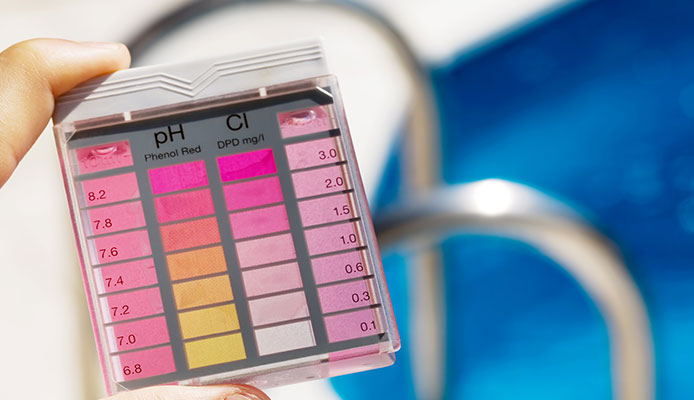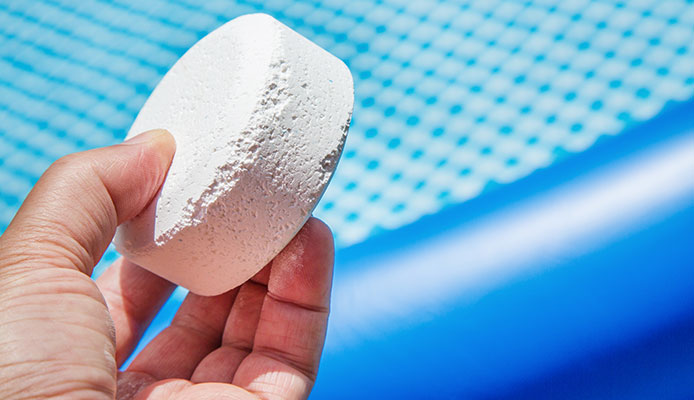
Allowing you to destroy bacteria introduced by swimmers and naturally-occurring micro-organisms such as algae, chlorine ensures that your pool is both clean and safe. Chlorine levels in the swimming pool do decline naturally. When this happens, you have to add chlorine to the pool water to maintain about 2.0 parts per million.
Liquid and tablet chlorine are commercially available and widely used forms of chlorine. In this liquid chlorine vs tablets comparison guide, we will help you understand the similarities and differences existing between the 2 forms of chlorine.
Liquid Chlorine Vs Tablets – How Do the 2 Forms Differ?
When comparing tablets vs liquid chlorine, most pool owners are usually trying to find the most convenient option. One thing you will realize after going through this tablet vs liquid chlorine guide is that the 2 forms of chlorine have both advantages and disadvantages. To choose the best option, you will have to weigh the limitations against the benefits.
Liquid Chlorine
Liquid chlorine happens to be the cheapest way of adding chlorine to both in-ground and above-ground pools. To add the pool chemical, all you will need to do is pour it directly into the pool water, in front of the return jet, to disperse it throughout your pool.
Since liquid chlorine does not have conditioners that release slowly into the atmosphere after being exposed to ultraviolet light, the chemical dissipates rapidly. For this reason, pool owners have to use their pool test kits more often since the water requires frequent readjustments.
For a gallon of liquid chlorine, the actual content of chlorine is approximately 10%. Therefore, to maintain ideal pool chemistry, you will need a large volume of liquid chlorine for the daily treatments. This is made more complicated by the fact that liquid chlorine usually has limited shelf-life in storage. You can only store liquid chlorine for a few weeks before it goes bad.
You might also like: Immediate Benefits Of Salt Water Pool
Chlorine Tablets
If your goal of comparing liquid chlorine vs tablets is to find the most cost-efficient way to maintain optimal chlorine levels in your swimming pool, you should consider using chlorine tablets. Considering tablets vs liquid chlorine shelf-life, chlorine tablets usually store well – they last longer than the liquid chlorine.
Unlike liquid chlorine, chlorine tablets contain stabilizers that guarantee the slow release of the chlorine. For this reason, chlorine tablets can sustain the level of chlorine in the swimming pool more consistently than in the liquid form. When using chlorine tablets, you get to put on your swim cap & swimming goggles and get in the pool for an extended period without needing to add more chlorine.
Comparing liquid chlorine vs tablets in terms of labor intensiveness, chlorine tablets feature minimal labor intensiveness. In most instances, the tablets are stacked in an inline chlorinator. The inline chlorinator gradually dissolves the tablet. The dissolved chlorine gets metered automatically into the pool water passing through the return line to the swimming pool.
Tablet chlorine can also be used in floating pool chlorine dispensers. The floating chlorinators disperse the chlorine slowly as they drift naturally around the swimming pool’s surface. Both in-line and floating chlorinators have minimal labor requirements.
It is important to note that some chlorine tablets contain other useful components. For example, in addition to containing a high percentage of chlorine, the tablets may have a water clarifier and an algaecide – this eliminates the need to purchase the 2 components and use them independently.
One of the downsides of using chlorine tablets is that they may cause acid build-up. This, however, only happens if you add the tablets in the pool skimmer when the pumps aren’t working. The acid can damage the gaskets and O-rings over time.
FAQs

Globo Surf Overview
If you have always wondered which differences exist between liquid chlorine vs tablets, this tablets vs liquid chlorine comparison guide should help you find the answer. Compared to liquid chlorine, chlorine tablets feature more pros than cons.
In addition to being cost-effective, the tablets require minimal labor and have a much better shelf-life. The main benefit offered by liquid chlorine is the ease of addition. However, since liquid chlorine requires more frequent readjustments, has a limited shelf-life, and is required in large volumes, using the tablet chlorine may be a more ideal option for most pool owners.
More Pool Chemistry Guides:
- How To Test Pool Water Without Kit?
- What Is Chlorine Lock And How To Break It
- How Often And How Much Chlorine To Add To Pool

